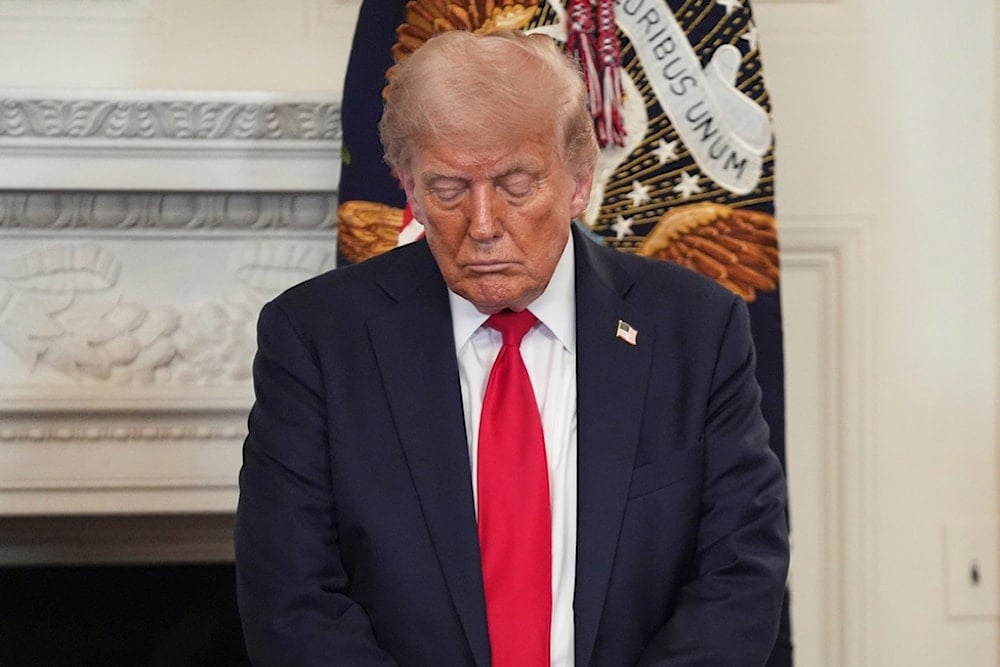Trump blindsides EU in trade talks, repeats global deceptive patterns
Trump threatened the EU with steep new tariffs just days after officials signaled a deal was near, mirroring recent shocks faced by Japan, Vietnam, and Iran in ongoing negotiations with Washington.
-

President Donald Trump bows his head in prayer during the White House Faith Office luncheon in the State Dining Room, Monday, July 14, 2025, in Washington, US. (AP Photo/Evan Vucci)
President Donald Trump has once again deployed his signature approach to international negotiations, blindsiding allies and adversaries alike, this time targeting the European Union. The abrupt escalation in US-EU trade tensions echoes a broader pattern witnessed in Trump's dealings with Japan, Vietnam, and Iran throughout 2025.
Trump blindsides EU despite positive trade signals
On Saturday, July 12, 2025, Trump shocked EU officials by threatening to impose 30% tariffs on European goods if no agreement is reached by August 1, tripling the current rate. The move caught Brussels off guard, despite a week of positive engagement and confidence from negotiators.
EU officials had expressed growing optimism about a pending deal. Even chief negotiator Maroš Šefčovič was widely praised, and European Commission spokespeople dismissed the likelihood of a new ultimatum. On Friday, EU trade spokesperson Olof Gill declared the bloc was “fully locked and loaded to conclude” a deal, expecting the US to maintain a 10% baseline tariff under a preliminary framework.
Instead, Trump issued a formal letter followed by a public social media threat, igniting frustration and disbelief among European diplomats. Finnish Trade Minister Ville Tavio described the move as surprising, noting the constructive tone that had defined prior discussions.
From optimism to ultimatum
EU officials, some of whom had been privately assured no further letters would be sent, were left scrambling. Gill had told reporters as recently as Wednesday: “My understanding is that we are not going to receive a letter.” By Saturday, that assumption was shattered.
Despite the setback, the EU sought to preserve diplomatic channels. Šefčovič emphasized continued engagement and reiterated the bloc's commitment to finding a negotiated solution before the deadline.
Japan and Vietnam, victims of Trump’s deceptive trade tactics
The EU’s experience mirrors what has become a hallmark of Trump trade tactics, characterized by delay, deception, and then escalation. Japan and Vietnam were both subjected to the same strategy earlier in the year.
Japan’s deep engagement ends in betrayal
Japan’s effort to secure a trade agreement involved seven rounds of high-level talks since April 2025. Chief negotiator Ryosei Akazawa made repeated trips to Washington, and Prime Minister Shigeru Ishiba personally engaged with US officials.
Despite this extensive diplomacy, Japan was stunned by sudden tariff increases, from an initial 24% to threats of 30% or even 35%. Trump publicly attacked Japan, calling it “spoiled” and falsely claiming it refused US rice imports, despite Japan buying $298 million worth in 2024.
The final insult came in the form of a “copy-and-paste” letter announcing 25% tariffs, identical in language to letters sent to 13 other countries. Ishiba responded by calling the decision “truly regrettable,” framing it as a direct challenge to Japan’s national interests.
Vietnam faces last-minute tariff shock
Vietnam, too, fell victim to last-minute shifts. Believing a 10–15% tariff had been secured, officials were blindsided when Trump announced a 20% rate via Truth Social, without prior warning. During a July 2 phone call with Party Chief To Lam, no figures had been mentioned.
The surprise was compounded by a vague 40% tariff on “transshipped” goods, casting uncertainty over Vietnam’s garment sector, which relies heavily on Chinese raw materials. The Vietnamese government responded cautiously, with state media avoiding direct comment and discouraging speculation, underscoring the depth of official dismay at this Vietnam tariff shock.
Diplomacy dismantled in Iran
Trump's deceptive diplomacy tactics extend beyond trade. Iran's experience in June 2025 illustrated how negotiations can be derailed by sudden military escalations.
Iranian officials, who had engaged in multiple rounds of nuclear talks with Washington, were caught off guard by the Israeli military strike on nuclear facilities. At the time, diplomacy appeared ongoing, with Muscat set to host a sixth round of talks. The attack on Iran came during “a limited negotiation process,” with many in Iran believing that the US had chosen dialogue with Tehran.
Trump later justified the Israeli assault by citing the expiration of a 60-day window he had set for nuclear progress, revealing that the diplomatic engagement was more of a cover for pre-planned military action than a genuine attempt at de-escalation.
Across these cases, a consistent methodology emerges
- False optimism: Public and private assurances are used to lull partners into complacency
- Public pressure: Trump often shifts course via public announcements or social media, undermining quiet diplomacy
- Manipulated deadlines: Arbitrary or shifting timeframes are used to maximize surprise and disrupt negotiation momentum
- Process disregard: Established diplomatic norms are overridden in favor of surprise actions and maximalist demands
The fallout from this approach is substantial. America's allies, including Japan and the EU, face strained relations and diminished trust. Economies are disrupted by abrupt policy changes, with manufacturers and markets struggling to adapt. The result is not just damaged alliances but a broader erosion of US credibility on the global stage.

 5 Min Read
5 Min Read










